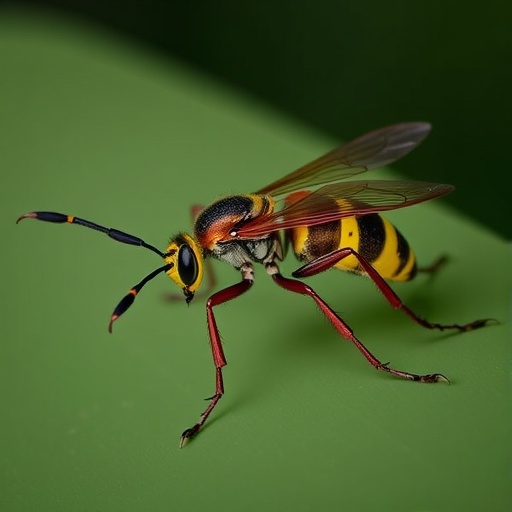For decades, scientists and environmentalists have recognized agriculture as a primary driver behind the alarming decline in insect biodiversity. The transformation of natural landscapes into farmland often means the removal of native vegetation, disrupting the delicate ecosystems that countless insect species depend upon. Activities such as frequent mowing and the widespread application of pesticides compound these impacts, significantly reducing the availability of suitable habitats and causing dramatic shifts in insect populations worldwide.
Recently, an innovative study conducted by a research team at Julius-Maximilians-Universität Würzburg (JMU) has uncovered evidence that the detrimental influence of agricultural land use on insect diversity may be far more severe than previously understood. Utilizing cutting-edge analytical techniques, the team evaluated insects spanning 400 different families collected across diverse habitats in the Bavarian region. This expansive and methodologically advanced approach has provided unprecedented insights into the true scope of biodiversity loss attributable to farming practices.
To gather data, the researchers deployed standardized insect traps strategically placed in both intensively farmed agricultural zones and adjacent near-natural areas. Once collected, the genetic material of these insect assemblages was analyzed through DNA metabarcoding, affording a highly efficient and accurate inventory of the species present. Crucially, the team employed statistical tools specifically designed to accommodate the unique characteristics of metabarcoding data, enhancing the precision of biodiversity estimates in ways not previously attainable.
One of the most striking findings was that insect sampling completeness was paradoxically higher within agricultural landscapes compared to the more diverse, natural habitats. This means that the proportion of species detected relative to those actually present was greater on farms, due to lower overall species richness making sampling efforts more exhaustive. After rigorously adjusting for these sampling differences, the results revealed a staggering 44 percent reduction in overall insect species diversity associated with agricultural land use—a figure significantly higher than earlier estimates.
Beyond species counts, the study also explored evolutionary diversity, which captures the breadth of phylogenetic relationships among insect species. This dimension considers not just the number of species but their evolutionary distinctiveness, effectively measuring how much evolutionary history is represented within a community. The research uncovered a nearly 30 percent loss in evolutionary diversity on farmland. This suggests that agricultural practices disproportionately eliminate not only species but also the evolutionary heritage that underpins ecosystem functions and resilience.
Prior assessments had overlooked these substantial losses in evolutionary diversity, largely due to methodological limitations and the absence of comprehensive phylogenetic data at relevant scales. By integrating novel computational approaches with extensive DNA metabarcoding datasets, the Würzburg team has paved the way for more nuanced and accurate biodiversity evaluations. Their framework systematically standardizes sample coverage, addressing biases inherent in previous monitoring programs and enabling cross-comparisons among habitats with differing species richness.
The implications of these findings are profound. Insects play pivotal roles in ecosystem services, including pollination, nutrient cycling, and as integral components of food webs. The dramatic reduction in both species diversity and evolutionary breadth threatens the stability and function of ecosystems globally. Dr. Mareike Kortmann, the study’s lead author, emphasizes the urgency of implementing biodiversity-sensitive land management strategies: “A continued decline in insect diversity could have far-reaching consequences for the health and stability of ecosystems. Our new method equips researchers and policymakers with a more precise tool to monitor and mitigate these losses.”
This research arrives at a critical moment when concerns about global insect declines—sometimes referred to as the “insect apocalypse”—are mounting. Traditional insect monitoring methods often fall short in resolution or fail to account for phylogenetic dimensions of diversity. The approach introduced by the JMU team combines high-throughput molecular techniques with robust statistical modeling, offering a blueprint for future biodiversity assessments that could influence agricultural policies and conservation efforts at an international scale.
Notably, the study’s findings challenge the perception that agricultural landscapes are merely marginally less biodiverse than natural habitats. Instead, the results underscore that farmland can be hotspots of biodiversity loss, with significant gaps in evolutionary heritage potentially compromising ecosystem functionality. Calls for biodiversity-sensitive land use practices now carry the weight of empirical, methodologically sound evidence, empowering stakeholders to rethink land management approaches.
As the study demonstrates, integrating molecular biodiversity surveys with advanced analytic frameworks enhances our understanding of anthropogenic impacts on insect communities. This synergy between technology and ecology is vital for mobilizing effective conservation responses. The authors envision that their methodology will be adopted worldwide to track ecological shifts more reliably and to evaluate the efficacy of restoration or rewilding projects aimed at reversing biodiversity declines.
Ultimately, this research spotlights the pressing need to balance human agricultural demands with the preservation of insect diversity—a balance essential to maintaining global ecosystem services. The novel insights provided by the Würzburg team not only deepen scientific comprehension but also galvanize action toward safeguarding the intricate web of life that insects support. As agricultural intensification continues to expand, adopting these cutting-edge assessment tools will be key to halting and potentially reversing the devastating losses of insect biodiversity.
Subject of Research: Animals
Article Title: A shortcut to sample coverage standardization in meta-barcoding data provides new insights into land use effects on insect diversity
News Publication Date: May 7, 2025
Web References: DOI:10.1098/rspb.2024.2927
Keywords: insect biodiversity, agricultural land use, DNA metabarcoding, evolutionary diversity, conservation biology, ecological monitoring, phylogenetic diversity, land management, ecosystem stability
Tags: agricultural land use impactbiodiversity loss in insectsconservation biology advancementsDNA metabarcoding in biodiversity assessmentecological impacts of farming practiceshabitat disruption and insectsinnovative research methods in ecologyinsect biodiversity in agricultureinsect population declinenative vegetation removalpesticide effects on ecosystemsWürzburg University conservation study





